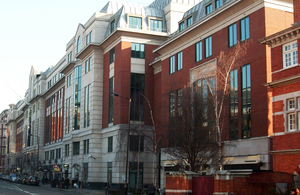Government crackdown on Blue Badge abuse
The government is implementing major reforms to crack down on drivers who abuse the disabled parking system.

The government is implementing major reforms to crack down on drivers who abuse the disabled parking system as part of the most comprehensive changes to the Blue Badge scheme for 40 years, Transport Minister, Norman Baker, announced today (14 February 2011).
Blue Badges provide a vital lifeline to over 2.5 million disabled people every year by prioritising key parking spaces close to important services. However increasing levels of badge fraud mean those who genuinely need to use these parking spaces often find themselves displaced by people who do not. In addition, the government estimates that badge fraud is now costing the UK an estimated £46 million a year, and is giving councils tough new powers to tackle this growing issue.
There have been very few changes to the Blue Badge scheme since it was introduced in the 1970s and the government believes that it is in need of modernisation.
The measures, which will start to come into force from April this year, include:
- providing local authorities with an on-the-spot power to recover badges that have been cancelled and misused
- shared administration between authorities - including an online application facility - resulting in faster renewals, reduced abuse and operational efficiency savings of up to £20 million a year
- wider use of independent mobility assessments to determine eligibility, including where previously that assessment was carried out by a GP; and support for this by giving local authorities control of National Health Service spend on Blue Badge assessments
- the replacement of handwritten badges with standard electronic ones which are harder to alter and forge
- extending the scheme to more disabled children under 3 years of age and severely disabled armed forces personnel and veterans; and removing residency requirements for disabled service personnel and their families who are posted overseas on UK bases
In order to finance the improvements, the maximum fee for a badge that local authorities can charge will rise from £2 to £10. This is the first increase in cost for 30 years and the government believes that, in return, badge holders will benefit from less abuse, improved accessibility and better customer services.
Transport Minister, Norman Baker, said:
The Blue Badge Scheme makes a real difference to millions of disabled people every day. However, it is clear that it is in real need of modernisation after forty years without major reform.
Such are the high levels of fraud in the current system that 50% of Blue Badge holders now find it difficult to get a parking space and Blue Badge fraud is estimated to cost £46 million a year.
The changes I am announcing today will crack down on Blue Badge misuse, modernise the system and extend eligibility to other groups such as more disabled children under three and severely disabled war veterans and service personnel. These improvements will mean that Blue Badge holders get a much better service for less than 1 pence per day.
Dai Powell OBE, Chair of the Disabled Persons Transport Advisory Committee (DPTAC) said:
These proposals can bring us one step nearer to a fairer and more consistently applied scheme. DPTAC hope to continue working closely with the department as it implements these measures to ensure they lead to better outcomes for disabled people.
Helen Dolphin, DPTAC Member and Director of Policy and Campaigns at Mobilise said:
We are pleased DfT have addressed some of the anomalies providing greater clarity to those who administer the scheme. One of the major criticisms has been the extent of regional variation in the administration. We hope local authorities will recognise the benefits these measures will offer in support of a consistent and uniform approach.
Background
There are 2.55 million badge holders in England and demand is rising significantly in line with the average age of the population.
Current levels of abuse are high as the financial benefits of having a badge are significant.
Consultations with disabled people, local authorities and other stakeholders have demonstrated a large amount of support for changes to be made to ensure the long term sustainability of the scheme for those who rely on it the most - this includes reforms that will help to ensure a fair allocation of badges, deliver efficiency savings and improve customer services and to tackle and reduce current levels of abuse.
A decision has been deferred until later in the year on whether or not to extend eligibility for a badge to people with temporary disabilities lasting at least 1 year, pending the outcome of independent research into the likely impacts on existing holders and local authorities.
Many of the changes will be implemented within a year; the reforms that involve changing primary legislation will take longer as they will depend on the availability of Parliamentary time.
A full impact assessment has been prepared which details the costs and benefits of the above reforms - this shows an overall net benefit for local authorities and no costs to the private sector.
Also being published today is a summary of responses to a consultation that ran between March and July 2010.
The consultation covers England only as the Blue Badge scheme is a devolved matter - the National Fraud Authority estimates Blue Badge fraud to be costing an estimated £46 million per year.
News desk enquiries
Media enquiries 0300 7777 878
Switchboard 0300 330 3000